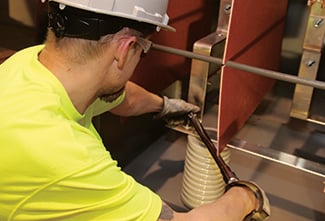 Electrical safety in the workplace doesn't just require hiring a top-notch electrical contractor. When planning any construction project -- including damage remediation following severe weather -- everyone near a work zone or area connected to electrical sources should be aware of potential risks. This can include parking lots and landscaped areas as well as buildings and their perimeters.
Electrical safety in the workplace doesn't just require hiring a top-notch electrical contractor. When planning any construction project -- including damage remediation following severe weather -- everyone near a work zone or area connected to electrical sources should be aware of potential risks. This can include parking lots and landscaped areas as well as buildings and their perimeters.
Even if a project doesn't appear to be related to your building's electrical system, energy risk factors need to be assessed professionally to maintain a safe workplace. A trained electrician can help to identify and eliminate risks that may arise during planned construction or disaster remediation.
It's also necessary to familiarize all employees with the potential electrical hazards of construction and emergency situations. Here are six basic scenarios about working near electricity that may be unfamiliar even to experienced maintenance crews.
1. Problems from Overhead
Downed power lines can occur for reasons ranging from auto accidents to storms. Power poles carrying these lines often accommodate fiber-optic cable and telephone lines as well. Although telephone wire contains little electricity and fiber-optic cable contains none, these lines can become dangerous conductors energized by the electrical lines that tumble down with them.
To avoid becoming part of an electrical circuit, everyone should stay at least 50 feet away from all downed lines until the local utility company and trained electricians can turn off power and repair the damage.
2. Underground Power Lines
Before beginning a landscaping project to beautify a commercial building, work site assessments of electrical risks are necessary. With information from the local utility company as well as tools for detecting power lines, a trained electrician can help your landscapers avoid danger spots.
3. Everyday Tool Hazards
Minor electrical jobs can lead to major zaps, especially if you don't know how to test a circuit to make sure that the power to a work site is definitely off.
If your maintenance staff is handling electrical repair work that requires a ladder, provide one made of insulated fiberglass. Remember that ladders made of aluminum and other metals are dangerous choices, because they conduct electricity. If a worker contacts a live circuit while on a metal ladder, his body completes the connection, resulting in an electrical shock.
4. Protection of Expensive Office Equipment
Most of us are familiar with power-strip surge protectors for home computers. However, there are many kinds of surge protectors to thwart damage to expensive office equipment such as computer networks, modems, satellite or cable lines and telephone systems.
Power surges can be very costly if your electrical system is not properly protected. A trained electrician has the necessary knowledge to install surge protection devices. Keep in mind that there are different levels of protection, ranging from whole-house to individual components.
5. Weather Remediation
When severe weather strikes, electrical lines and building electrical systems often are damaged and become dangerous in unexpected ways. For example, when heavy rains create mudslides they also create a medium through which electricity from fallen lines travels more easily.
Whole structures may become electrical hazards after flooding. Most building materials, such as wood, don't conduct electricity when dry. However, when saturated, even wood becomes an electrical hazard. Professional electricians know how to navigate these difficulties.
6. Final Inspection
Whether construction projects are planned or precipitated by disaster, you need to ensure that a job site is inspected and every precaution is taken to protect yourself and others from injury.
Contractors aren't the only ones at risk when working around electricity. Everyone who enters and works on your premises needs protection. Potential energy hazards should be recognized and addressed before a project begins. Before any circuits are re-energized, final inspection by trained professionals is necessary to be absolutely certain the electrical system is safe.
Bonus Tip: What's the Difference Between Electrical Shock and Electrocution?
Many don't realize that the term electrical shock is not synonymous with the term electrocution. Poor construction, shoddy electrical wiring, mishandling electrical components, or simply being in the wrong place near live electrical wires, may result in an electric shock. Electrical shock is the result of an electrical current running through a person's body. It involves electrical harm to the person and can be strong enough to cause severe and long-lasting injury. Electrocution, on the other hand, is the term used when that shock results in death.
[This blog was originally published on October 15, 2014. It has been updated and republished on November 23, 2022.]